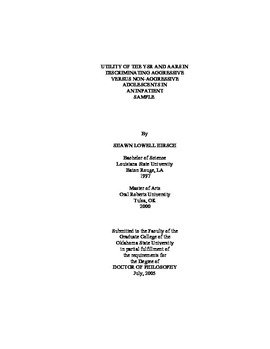| dc.contributor.advisor | Stinnett, Terry | |
| dc.contributor.author | Hirsch, Shawn Lowell | |
| dc.date.accessioned | 2013-11-26T08:34:33Z | |
| dc.date.available | 2013-11-26T08:34:33Z | |
| dc.date.issued | 2005-07 | |
| dc.identifier.uri | https://hdl.handle.net/11244/7432 | |
| dc.description.abstract | Scope and Method of Study: The amount of youth in the mental health care system, particularly in out of home placements, has dramatically increased over the last two decades. Youth aggression is both a significant societal problem not only in the settings of community, home, and school but also within inpatient facilities who treat youth with behavioral or emotional concerns. The goal of this study was to determine whether or not aggressive behavior of inpatient youth could be predicted, upon their admission, by the use of self-report measures of behavior and personality. 87 adolescents admitted to the inpatient psychiatric units of Tulsa Regional Medical Center, a hospital in Tulsa, Oklahoma were given a brief interview, the Child Behavior Check List Youth Self Report, and the Adolescent Anger Rating Scale. The Retrospective Overt Aggression Scale was used to gather information, via staff direct report as well as chart review, about the actual aggressive behaviors demonstrated by the youth in the study for the first two weeks of their stay. | |
| dc.description.abstract | Findings and Contributions: The results of this study indicated that higher levels of total aggressive behavior displayed on the inpatient unit by the youth were predicted by the construct of reactive anger. Higher levels of verbal aggression were significantly predicted by the combination of having a history of physical aggression and being raised in a non-intact household. The results of the study also indicated that aggressive youth could be discriminated from non-aggressive youth by the Oppositional Defiant Disorder scale of the Youth Self Report. The findings of this study could help inpatient units screen youth admitted to their programs to determine potential for aggressive behavior on the unit. This may lead to more specific and appropriate treatment planning as well as milieu management. | |
| dc.format | application/pdf | |
| dc.language | en_US | |
| dc.rights | Copyright is held by the author who has granted the Oklahoma State University Library the non-exclusive right to share this material in its institutional repository. Contact Digital Library Services at lib-dls@okstate.edu or 405-744-9161 for the permission policy on the use, reproduction or distribution of this material. | |
| dc.title | Utility of the YSR and AARS in discriminating aggressive versus non-aggressive adolescents in an inpatient sample | |
| dc.contributor.committeeMember | Mesmer, Eric | |
| dc.contributor.committeeMember | Duhon, Gary | |
| dc.contributor.committeeMember | Fuqua, Dale | |
| osu.filename | Hirsch_okstate_0664D_1397.pdf | |
| osu.accesstype | Open Access | |
| dc.type.genre | Dissertation | |
| dc.type.material | Text | |
| thesis.degree.discipline | School Psychology | |
| thesis.degree.grantor | Oklahoma State University | |
